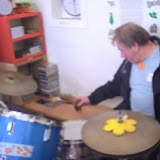 |
M3cube
Juniors/seniors :
|

|
HAHAS Project: Health Education and Humour for Seniors in Europe Partners :UK (coordinator) Intergen Community Interest Company www.intergen.org.uk Germany Amt für Gesundheit www.gesundheitsamt.stadt-frankfurt.de France Association M3 (MCube) www.m3cube.asso.st Summary of the projectIn the HAHAS project the partners will visit and learn about each others countries through the exploration of humour as it is manifest in many art forms. Together we will: 1 Learn the theory and practice of humour to promote health, well being, and learning in later life, as well as improving communication and motivation. 2 Explore the manifestations of humour in different media in our different countries, for example through dance, cartoon, theatre, film and song, and learn the vocabularies of humour across our four countries. 3 Learn each others' languages through our exploration of our countries' art forms. 4 Use IT skills to share our new learning across our countries, locally and nationally and with other people in the life long learning community. 5 Produce a web site, a post card 'laughter is the best medicine ' in all our languages. 6 Create some examples of humour in different art forms and share these with other colleagues in life long learning organizations. 7 Develop a resource pack of information about humour from our countries and a calendar of cartoons with input from our four countries; a song and sketch we create using all our languages. 8 Ensure the continued engagement of older citizens in learning and promote their continued participation in society and creative activities. MEETINGSKickoff meeting in London - october 2010:Minutes Meeting in ParisAgenda Meeting in Paris Meeting in FrankfurtAgenda Photos from Monique
Photos from Happy Germany
Related press articles: Laughter really is the best medicine ... Motivation : The health benefits of humour and laughter are well known. These include the reduction of stress levels, promotion of relaxation, strengthening of the immune system, reduction of high blood pressure and heart disease. It also has social benefits, such as improving self confidence, self image, general mental health and well being. This project will enable older learners and staff to gain new knowledge and skills to promote humour in their own lives and that of their families and friendship networks, as well as in their work places. As the number of older Europeans increase, there is a need to find new ways of improving the quality of life of older learners and enhancing active ageing. There is also a need to encourage mobility and break down European stereotypes many of which are negative in nature. This project takes a new approach to achieving these aims. It will use the study of humour and laughter, both theory and practice, as it is manifest in many different art forms to promote these ends. Participants will learn from humour specialists about the theory of humour and its role in their lives. They will practice these techniques to apply this knowledge to their daily lives, thus enhancing their quality of life. They will learn about different art forms in which humour is expressed, studying these together. We will include the cartoons, comics, art, music, dance, film and theatre, in digital and non digital formats, in which humour is expressed from each of countries, and learn some of each others language in the process. Objectives and strategy A: Our objectives are: 1 To learn about: • Humour in our countries as it is manifest in a range of art forms for example, cartoons, comics, art, music, dance, film and theatre • The theory and practice of laughter, its importance for health, getting rid of stress and improving performance and motivation 2 To create together in our three European languages : • Materials about humour to be used by other learners • Products to promote humour; a calendar, postcards, theatre and songs • A tool-kit to promote humour in health education and a collection of examples of humour using digital and non-digital media, all available on a web site which we shall make. B: The problems we will address are: • Lack of knowledge of each others humour and the art forms in which it is expressed • Lack of knowledge of the language of each others countries which prevents our fully understanding each others humour • Negative stereotypes we hold of each other in terms of humour • Failure to use humour to promote learning, communication and motivation |



